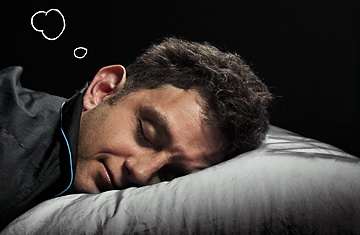
(4 of 4)
Synapses--the cell-to-cell links that serve as the bits of the brain's operating system--play an important role too. Each brain cell can link to more than just one other, and it would seem that the more connections there are, the better, since that makes for a richer system. That's indeed true, but only to a point. Too many connections can lead to chaotic free association rather than organized thought. So the brain must periodically clear out the synaptic underbrush--analogous to "running a repair-and-cleaning program on your computer to defrag the hard drive," says psychologist William Killgore of Harvard Medical School.
The hormone cortisol, which rises during REM, then helps form new and imaginative ideas from the data that survives the defrag. Cortisol is commonly described as a stress hormone and tends to fracture memory. It has the same effect when we're asleep, and Payne believes this encourages the unbinding and rebinding of images that can define dreams. "The brain dislikes fragmentation, so it weaves narratives," she says. "And that, in turn, gives rise to novel thinking."
Dopamine is another ingredient in the brain's secret creative sauce. Harvard psychologist Shelley Carson points out that dopamine levels rise in pleasure centers of the brain both when we're dreaming and when we're being creative. This serves as a reward and reinforcement that keeps the dreams--and ideas--flowing.
Controlling the Process
As with all other matters scientific, the question of causation comes up. Are we all equally imaginative in our sleep, or do people who are already creative in their waking hours retain that edge at night? Much as it would be nice to think that sleep is a great democratizer, the fact is, creative types might indeed have an advantage around the clock. Psychologist David Watson of the University of Notre Dame tracked 200 subjects over three months and found that those who scored high on creativity scales when they were awake tended to remember their dreams more.
"One reason is that they simply have more vivid and interesting dreams," he says. "That's linked to having an active fantasy life; the daytime behavior shades over into the night. This is a case of the rich getting richer."
That's not to say the creative middle class can't aspire to join that metaphorical 1%. The best strategy for remembering dreams is keeping a journal next to your bed, says Watson. Avoiding alcohol and caffeine is also wise since they scramble the NREM and REM cycles. Barrett's studies suggest that engaging in some type of prebedtime priming--contemplating a problem you'd like to solve--increases the likelihood that sleep will bring some answers. Up to a third of the subjects in her sample group reported that priming had helped them find a solution that had eluded them during the day.
None of this guarantees that a good night's sleep is the panacea for what ails you creatively. But nor does it change the fact that the odds are in your favor. You have problems every day, after all, and you go to bed every night. Even if you don't think of yourself as creative, your sleeping brain will sometimes prove otherwise.
